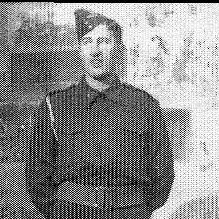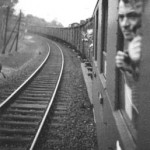The Long Journey
Part Two: Three Days in a Cattle Truck
Michael Whiteman’s graphic account of his days as a German Prisioner of War
We got to the top of the town to find lots of other lads had been brought there. And so started a slow trek, to where, we knew not. I remember going back through St. Omer that evening, being put into a field for the night. The next few days were very hot and we were all starting to suffer with nothing to drink or eat. I found myself picking dandelion leaves and sorrell to chew keeping my mouth more moist. My toes were getting sore and blistered. Luckily I had some Germolene ointment with me which helped no end. I remember one night four of us sat back in a field, the next morning when we woke we looked like snowmen with frost and we were so stiff we could hardly move. Any streams we passed we hand cupped water to moisten our mouths. We got to a castle one evening being given a packet of our own hard tack biscuits. Still moving slowly south we eventually got to Cambrai Castle. Swarming inside like ants and still no more to eat. Come morning a number collected at the gate. We were taken on the railway. While waiting for a train, we found a barrel of red wine which we managed to open. One fellow had a tin so we all had a drink, which boosted our ego. At last on the train we were taken south to Givet, also still on the Belgium border. We were taken to a large sports stadium in a terric thunder storm with heavy rain, we had to stand and take it. It was here that some soup was given out. Not having anything to put it in we had the bright idea of taking the rubber of our tin hats. Putting the screw back, we had a large bowl for our soup. Which was the first food since leaving Calais. Next morning went back to the railway, tin hats had to be dumped and we entrained for Trier, Germany, through Luxembourg. This was a passenger train about 16 to a compartment. Some laid on the luggage shelf or on the floor. One lad found a huge piece of bacon rind with quite a lot of fat still on it. After picking off the dust it was passed all round and all of us had quite a suck of it. What a lovely flavour? Eventually getting to Trier we were marched up a steep hill to a camp at the top. All the civie Germans lining the roads were spitting at us on the way and shouting abuse. The so and so’s we thought? (and a bit more). Here we’re given a bowl with pork soup and potatoes in it, plus squares of pork fat. We were in clover. Plus a slice of bread. But all this did not last.
Once again, a few hundred of us were marched back down this double S bend hill to the station where a long row of cattle trucks were standing. We were loaded forty to a truck and locked in so we started on another journey to somewhere we did not know. I seemed we were going so slowly and the springs of the trucks were non-existent. Sometimes we leant against the side of the truck, sometimes stood and then squatted on the floor. The pork soup we had had then started to affect the bowels of some of the chaps. Luckily I was OK, but those that weren’t wondered what to do for the best. Everyone decided to use one door where there was a larger crack. Squat down squirt and hope for the best. We trundled slowly along all that night till midday wondering when we stopped at a station. We could see it was Dresden. Luckily the clean side door was opened. I think it was Red Cross ladies that handed into us pieces of bread and a small amount of drink in paper type cups. The doors were shut and we were again on the move trundling along and thump, thump, thump, as the old trucks went over the joints of the rails. It again became dark and for a long while we were pushed into a aiding for several hours it seemed. Through the small iron railed windows we could see some shunting going on with other trains. What station it was I’ve no idea.
At last we moved on again, I think we all managed to get some sleep, but by now were getting very exhausted, weary and worn. It was now two days and a bit in this horrible wagon when we went slowly through the station of Posnan. We knew then that we were in Poland. On we went for another few hours, eventually stopping at Schubin somewhere in North Poland. We started to slowly unload. We were so stiff and weak we could hardly stand and get going. Several lads had died on the way, some were unable to walk so we were pushed into trucks to ride to the camp where the rest of us marched through the town with some of the Polish people watching. If they got too close to us the guards rifle butted them back out of the way and so we entered XXIB camp at Schubin. We filled palliasses with straw and flopped out for a rest. We were given a bowl and a spoon which we kept for our daily meal of soup with potatoes, a bit of sausage sometimes flavoured with caraway seed or sauerkraut which was not liked at all. We found we were unable to sit out in the sun as it was very hot in early June.
We either got giddy or blacked out. The Germans were now getting organised in batches we were having our photos taken with our own numbers on large numbers held in front of us. We were then given out I.D. disc with the number on it. After several days we were slowly getting our strength back and feeling more like living again. We were told that one of our S/L lads had died not recovering from all the exhausting days. Before that we all endured. I’m not sure of the right date now, June 14 or 15. The church bells were ringing. We were told that Paris had now fallen and was in German hands. On the 20th June we were given our first postcards to write home. This card reached home the end of September. My family were so elated. My sister was a parlour maid at Woodside House opposite the Cock Horse Inn. Mr Richards told her to go straight down to New House Farm hop garden to tell the rest of my family that I was safe and a P.O.W. This card reached home two or three weeks before the war office notified my family of my whereabouts. They did not know whether until now if I was dead or alive! That’s from early May till the end of September.
Early in July about 250 of us were taken back south towards Posnan close to a Polish cavalry camp that was before being taken over. Our camp consisted of two long wooden buildings that held about 200 people in each. The double barbed wire fence had not yet been finished so some of our lads were put on a daily job until it was completed. The rest of us were taken out daily in batches of twenty to fifty in number. Digging ditches deeper along the roadsides quite often with German shells whistling over the top of us when they were in training. I remember once having to lay flat down when the infantry came running over a small mound from a wood firing their wooden bullets over the top of us. Our guards ran away which left us laughing our heads off. Coming back one day we found some lads looking through their uniforms. Yes they had found creepy crawlies, lice; that started the whole camp looking. We had our clothes on for such a long time without washing properly. A gang of Germans came in and shaved off all the hair on our heads. We all laughed at each other for how we were now looking, like bald coots? We were all marched down to the cavalry camp to a delousing building where all our clothes went through this gassing system and then hanging everything on outside lines until the horrible smell had dispersed. In the meantime all the lads had a long shower which was enjoyed by all.
October saw us moved down into the old Polish camp. At the end of October the weather had started to get colder a bit of heat came from a little coal stove in each hut. The snow had started early in November. Different batches of men were taken down to the railway to unload wagons of bricks coming in daily, these all had to be unloaded by hand. Our hands were now getting very sore and painful. I was put onto building huts for refugees from Germany. Working on the top ceiling fixing when the roof suddenly collapsed. I fell dead weight eighteen feet onto my back, yelling out with terrific noise. The pain was so bad as I lay there, I was sure I was on the way out for good. My mates gently lifted me onto a door, six of them carried me back to camp each step jolting my back and me reeling in pain. I was laid on a table in the sick bay. A German medic wanted to know if I could move my toes, which I was able to do. I was put to bed and each day for six days was painted over the spinal area where the damage was with iodine. It was very badly bruised and I’m sure one of the vertebrae was out of place. No X-rays were available at this time, you were one of a number and if you passed out just too bad!! After about a week I was able to just shuffle along. I was put back into my hut and each day had to go to another hut for our orderlies to massage my back using French chalk so as to get a smooth rub. For weeks I had very bad back ache.
There was snow on the ground now and only half the lads had coats and hats to go out in. I had previously worn a cavalry coat and “Polish” hat. Only the lads with coats could go out to work which we had to, even clearing snow. I let another mate have mine so I could still rest my back. I remember on occasions when coming back home I did go out, delving into dustbins at the back of the German’s mess halls to find large bits of their brown bread which we grabbed to take back and scrapping off the green and blue mould to give us a bit more to eat. Christmas came when we made our own enjoyment and we were issued with two little bottles of beer. The guards called it Kinder beer. It was darkish with a liquorice flavour. I’m sure you’d never get drunk however much you had. So ended the year of 1940. We all wondered what the next year would bring. This camp was near the River Warther. The number of it was XX1BZ-A-I.
To be continued
From the November 2007 issue of Rye’s Own
All articles, photographs, films and drawings on this web site are World Copyright Protected. No reproduction for publication without prior arrangement.
(Hard Copy Back Numbers Available)
© World Copyright 2015 Cinque Ports Magazines Rye Ltd., Guinea Hall Lodge Sellindge TN25 6EG

